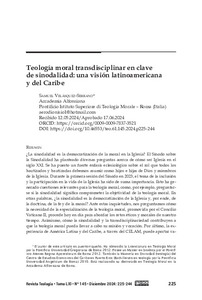Por favor, use este identificador para citar o enlazar este ítem:
https://repositorio.uca.edu.ar/handle/123456789/19843| Título: | Teología moral transdisciplinar en clave de sinodalidad: una visión latinoamericana y del Caribe | Otros títulos: | Transdisciplinary Moral Theology in the Key of Synodality: a Latin American and Caribbean Vision | Autor: | Velásquez Serrano, Samuel | Palabras clave: | TEOLOGIA MORAL; SINODALIDAD; TRANSDISCIPLINARIEDAD; CONCILIO VATICANO II | Fecha de publicación: | 2024 | Editorial: | Pontificia Universidad Católica Argentina. Facultad de Teología | Resumen: | ¿La sinodalidad es la democratización de la moral en la Iglesia? El Sínodo sobre la Sinodalidad ha planteado diversas preguntas acerca de cómo ser Iglesia en el siglo XXI. Se ha puesto un fuerte énfasis eclesiológico sobre el rol que todos los bautizados y bautizadas debemos asumir como hijos e hijas de Dios y miembros de la Iglesia. Durante la primera sesión del Sínodo en 2023, el tema de la inclusión y la participación en la vida de la Iglesia ha sido de suma importancia. Esto ha generado cuestiones relevantes para la teología moral, como, por ejemplo, preguntarse si la sinodalidad significa comprometer la objetividad de la teología moral. En otras palabras, ¿la sinodalidad es la democratización de la Iglesia y, por ende, de la doctrina, de la fe y de la moral? Ante estas inquietudes, nos preguntamos cómo la necesidad de la especialización de la teología moral, promovida por el Concilio Vaticano II, procede hoy en día para abordar los retos éticos y morales de nuestro tiempo. Asimismo, cómo la sinodalidad y la transdisciplinariedad contribuyen a que la teología moral pueda llevar a cabo su misión y vocación. Por último, la experiencia de América Latina y del Caribe, a través del CELAM, puede aportar valiosos frutos sobre la reflexión basada en la madurez de ciertos caminos históricos recorridos en estos aspecto Is synodality the democratization of morality in the church? The Synod on Syno dality has raised various questions about how to be Church in the 21st century. A strong ecclesiological emphasis has been placed on the role that all baptized men and women must assume as sons and daughters of God and members of the Church. During the first session of the Synod in 2023, the theme of inclusion and participation in the life of the Church was of utmost importance. This has gene rated relevant questions for moral theology, such as whether synodality means compromising the objectivity of moral theology. In other words, is synodality the democratization of the Church and, therefore, of doctrine, faith, and morality? In response to these concerns, we question how the need for the specialization of moral theology, promoted by the Second Vatican Council, applies today to address the ethical and moral challenges of our time. Additionally, how synodality and transdisciplinarity contribute to moral theology’s ability to fulfill its mission and vocation. Finally, the experience of Latin America and the Caribbean, through CE LAM, can offer valuable insights based on the maturity of certain historical paths taken in these areas. |
URI: | https://repositorio.uca.edu.ar/handle/123456789/19843 | ISSN: | 2683-7307 (online) 0328-1396 (impreso) |
Disciplina: | TEOLOGIA | DOI: | 10.46553/teo.61.145.2024.p225-244 | Derechos: | Atribución-NoComercial-CompartirIgual 4.0 Internacional | Fuente: | Teología. Tomo 61, No. 145, 2024 |
| Aparece en las colecciones: | TEO - 2024 Tomo LXI nro. 145 |
Ficheros en este ítem:
| Fichero | Descripción | Tamaño | Formato | |
|---|---|---|---|---|
| teologia-moral-transdisciplinar.pdf | 355,95 kB | Adobe PDF |  Visualizar/Abrir |
Este ítem está sujeto a una Licencia Creative Commons

